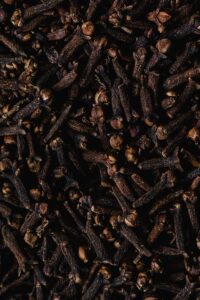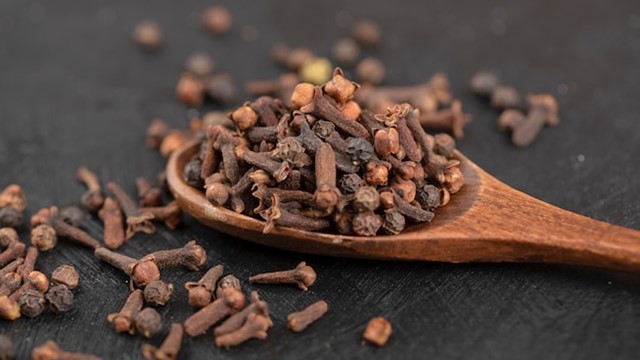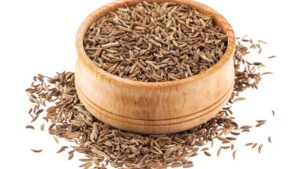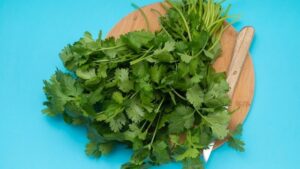Cloves are the dried flower buds of the Syzygium aromaticum tree, native to Indonesia’s Maluku Islands. They boast a distinctive appearance: small, dark brown, nail-shaped buds with a tapered stem. This spice is renowned for its intense aroma, warm, sweet flavor, and strong, pungent taste.

Historical Significance
The historical significance of cloves is rich and multifaceted, spanning centuries and continents. Here’s an in-depth look at the historical journey of cloves:
Ancient Origins and Spice Trade
Originating in the Spice Islands
Cloves, botanically known as Syzygium aromaticum, trace their origins to the Maluku Islands, also known as the Spice Islands, in present-day Indonesia. These islands were the exclusive source of cloves for centuries.
Spice Routes and Global Trade
Cloves were among the valuable commodities that fueled the ancient spice trade. Arab traders played a pivotal role in spreading cloves across regions through trade routes connecting Asia, the Middle East, and Europe. They were highly prized for their aromatic richness and medicinal properties.
Medicinal and Cultural Uses
Traditional Medicine
In various ancient cultures, cloves were esteemed for their medicinal qualities. They were used in traditional Chinese medicine to address digestive issues, as well as in Ayurvedic medicine in India for their analgesic and antibacterial properties. Clove oil, derived from the buds, was applied topically for toothaches and sore gums.
Symbolism and Religious Significance
Cloves held symbolic importance in different cultures. In some regions, they were associated with love, purity, and protection. They were used in rituals, religious ceremonies, and as offerings to deities, symbolizing purification and healing.
Exploration and Colonialism
European Quest for Spices
During the Age of Exploration, European powers sought direct access to the spice-producing regions. This quest for cloves and other spices like nutmeg and pepper led to the discovery of new trade routes and the colonization of spice-rich lands.
Impact on Trade and Economies
The demand for cloves and other spices shaped global trade patterns, leading to fierce competition among European powers. The Dutch, Portuguese, and later the British, established spice plantations and monopolies in regions like the Moluccas and the island of Zanzibar, significantly impacting local economies and societies.
Modern Cultivation and Global Influence
Spread to Other Regions
While cloves were originally exclusive to the Maluku Islands, they are now cultivated in various tropical regions worldwide. Countries such as Madagascar, Sri Lanka, India, and Tanzania became significant producers of cloves, contributing to their global availability.
Culinary and Cultural Significance Today
Cloves continue to be an essential spice in cuisines globally, lending their distinct flavor and aroma to a wide array of dishes. They are also valued for their use in perfumery, cosmetics, and aromatherapy.
Preservation and Revival of Traditional Practices
In some cultures, traditional uses of cloves in medicine, cooking, and rituals persist, with efforts to preserve and revive these ancient practices.
Culinary Uses
Cloves, with their intense aroma and distinctive flavor, have a wide range of culinary uses across various cuisines. Here’s a detailed look at their culinary versatility:
Flavor Profile and Culinary Characteristics
Distinctive Flavor
Cloves possess a complex flavor profile characterized by a warm, sweet, and slightly bitter taste with strong aromatic notes. The essential oils in cloves, particularly eugenol, contribute to their robust and spicy taste.
Forms of Cloves
- Whole Cloves: These small, dried flower buds are often used in cooking and are identifiable by their nail-like shape.
- Ground Cloves: Powdered cloves offer convenience and are used in recipes where a smoother texture is desired.
Culinary Applications
Spice Blends and Seasonings
- Garam Masala: A staple in Indian cuisine, garam masala incorporates cloves along with other spices like cardamom, cinnamon, and cumin.
- Pumpkin Pie Spice: Commonly used in autumnal desserts, this blend typically includes cloves, cinnamon, nutmeg, and ginger.
Savory Dishes
- Meat Marinades: Cloves add depth to marinades for meats like pork, beef, and lamb, infusing them with a warm and aromatic flavor.
- Curries and Stews: They are a key ingredient in many curry blends, enriching dishes with their unique taste and fragrance.
Sweet Treats and Desserts
- Baked Goods: Cloves are featured in gingerbread, spiced cakes, cookies, and fruitcakes, lending a delightful warmth to these treats.
- Mulled Beverages: Cloves are an essential component of mulled wine and cider, imparting a comforting and spicy essence.
Tips for Using Cloves in Cooking
- Balancing Act: Due to their potent flavor, use cloves sparingly to avoid overpowering a dish. A little goes a long way.
- Whole vs. Ground: Whole cloves work well in slow-cooked dishes, while ground cloves evenly disperse their flavor in baked goods and sauces.
- Infusion and Removal: When using whole cloves, infuse them in the dish and remove before serving to prevent an overwhelming taste.
Pairing Suggestions
- Complementary Spices: Cloves pair well with cinnamon, nutmeg, ginger, and cardamom, enhancing the overall spice profile.
- Foods: They complement both sweet and savory ingredients, including fruits like apples and pears, as well as meats, rice dishes, and sauces.
Health Benefits
Cloves offer not just aromatic and culinary benefits but also possess various potential health advantages due to their rich nutritional profile and active compounds. Here’s an exploration of the potential health benefits associated with cloves:
Nutritional Composition of Cloves
Cloves are a storehouse of nutrients and bioactive compounds:
- Vitamins and Minerals: They contain vitamins like vitamin K and vitamin C, as well as minerals like calcium, magnesium, and potassium.
- Fiber: Cloves are a good source of dietary fiber, aiding in digestion.
- Essential Oils: The main active component in cloves is eugenol, an oil with potential health benefits.
Antioxidant Properties
- High Antioxidant Content: Cloves are rich in antioxidants that help combat oxidative stress by neutralizing harmful free radicals in the body. These antioxidants contribute to overall health and may potentially reduce the risk of chronic diseases.
Anti-Inflammatory and Analgesic Effects
- Anti-Inflammatory Benefits: Compounds in cloves exhibit anti-inflammatory properties that may help reduce inflammation in the body, contributing to improved overall health.
- Analgesic (Pain-Relieving) Properties: Eugenol, found abundantly in cloves, acts as a natural analgesic. Clove oil or clove-based products are sometimes used topically to relieve toothaches and muscle pain.
Digestive Health
- Aids Digestion: Cloves have been traditionally used to aid digestion. They may help alleviate indigestion, bloating, and gas due to their carminative properties.
Oral Health Benefits
- Dental Health: Eugenol, with its antibacterial properties, is commonly used in dental care. Clove oil or clove-based dental products can help alleviate toothaches and gum pain. Additionally, cloves may assist in controlling oral bacteria and maintaining oral hygiene.
Blood Sugar Regulation
- Potential Blood Sugar Control: Some studies suggest that cloves might help regulate blood sugar levels, which could be beneficial for individuals managing diabetes. However, more research is needed in this area.
Cautions and Considerations
While cloves offer potential health benefits, it’s essential to use them in moderation. Concentrated forms like clove oil can be potent and may cause irritation if used excessively.
Pregnant and breastfeeding women, individuals with bleeding disorders, or those on blood-thinning medications should consult healthcare professionals before using concentrated clove products.
Incorporating Cloves into Your Diet
- Add cloves to teas, soups, stews, and curries for flavor and potential health benefits.
- Use powdered cloves in baking for a warm, spicy flavor in cakes, cookies, or bread.
Modern-Day Use and Availability
In the modern era, cloves continue to hold significance in various aspects, including their cultivation, availability, and wide-ranging use in different industries. Here’s an overview of the modern-day use and availability of cloves:
Global Cultivation
Diverse Cultivation Regions
- Cloves are no longer limited to their original growing regions in the Maluku Islands of Indonesia. They are now cultivated in several tropical regions worldwide.
- Major producers include Madagascar, Sri Lanka, Tanzania, India, and other countries with suitable tropical climates.
Commercial Availability
Common Forms
- Cloves are available in various forms, catering to diverse culinary and medicinal uses:
- Whole cloves: Small, dried buds used in cooking and infusions.
- Ground cloves: Powdered form suitable for baking and incorporating into various dishes.
- Clove oil: Extracted oil used in aromatherapy, dental care, and topical applications.
Availability in Markets
- Cloves are readily accessible in most grocery stores, supermarkets, spice shops, and online marketplaces, ensuring their availability to consumers worldwide.
- They are often sold in spice blends, packaged individually, or incorporated into pre-made seasonings.
Culinary and Beverage Industry
Culinary Uses
- Cloves remain a staple spice in many cuisines globally, used in both savory and sweet dishes. They are integral to spice blends like garam masala, mulled wine mixes, and various curry powders.
- The aromatic and distinct flavor of cloves continues to be appreciated in a multitude of recipes, from traditional dishes to innovative culinary creations.
Beverages
- Cloves are essential in creating warming and flavorful beverages like mulled wine, cider, teas, and infusions, especially during colder seasons.
Health and Wellness Industry
Natural Remedies
- Cloves and clove oil are still utilized in natural and holistic health practices. Clove oil’s analgesic properties make it a popular ingredient in dental care products, such as toothpaste and mouthwash, aimed at alleviating toothaches and promoting oral health.
- In aromatherapy, clove oil is used for its soothing and aromatic qualities.
Industrial Applications
Perfumery and Cosmetics
- The aromatic essence of cloves finds use in perfumery and cosmetics. They contribute to fragrances, soaps, lotions, and essential oils.




